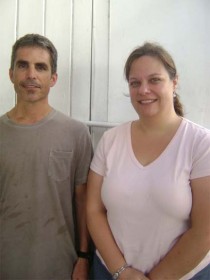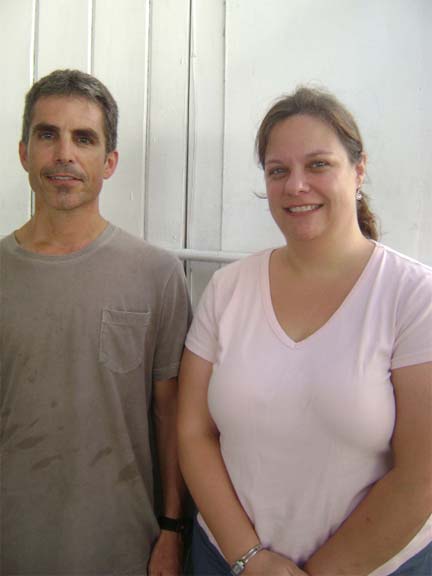–but more women being screened, treated
By Iana Seales
The incidence of cervical cancer remains high in Guyana but greater awareness has resulted in more women getting screened and treated earlier, according to Dr John Varallo of the Jhpiego Organisation, which is currently collaborating with the Health Ministry.

The initial data which was collected during the past nine months and involved extensive screening pointed to a troubling aspect of cervical cancer locally. Dr Varallo referred to it as “a big issue” saying that what they are finding with this project and previous work he has done in the interior is “rates that are seven times higher than [the official rate]”. However, he noted the current project by the US group is helping to build capacity within the country to be able to impact on the numbers.
Guyana is noted as having one of the highest rates of cervical cancer anywhere but over the past few months the Health Ministry has deepened its collaboration with Jhpiego to have local providers trained in screening for cervical cancer. To date, 13 providers from various sites across the country have been trained. The main screening and treatment site has been set up at the Georgetown Public Hospital while other sites are based at the Campbellville Health Centre, New Amsterdam Hospital, St Joseph’s Mercy Hospital and the Dorothy Bailey Health Centre.
Dr Varallo, an Obstetrician and Gynaecologist with Jhpiego, spoke with Stabroek News at the end of a recent campaign to screen women locally for free which was advertised in the local press. He was accompanied by Megan Harris, Monitoring/Evaluation Officer at the same organization. He disclosed that providers here have been trained to use the Visual Inspection with Acetic (VIA) and the Single Visit Approach. He said the whole idea behind the initiative is to detect pre-cancer.
According to Dr Varallo, they are focused on identifying pre-cancer so that they can treat it. He explained that the new approach allows them to produce the results within a minute and depending on what they find, they can treat right there. In one visit, he said they can screen and treat women using cryo-therapy which he said takes a few minutes.
Since January they have screened over 2,000 women at the public hospital alone, and about 500 women screened positive for pre-cancer in general. The women were treated on the spot and according to Dr Varallo a good number of those women could have gone on to develop cervical cancer. He estimates that around 700 women responded to the recent campaign with early indications showing that some women have tested for pre-cancer while some cancer was also detected. He noted that some sites did great this time around while others were slow, adding that they are yet to get the official numbers. Still, he called it a success and disclosed that they have bookings for the next few weeks.
“Women wanted to be there and they were bringing families and co-workers, it was really tremendous,” Harris said recalling that staff at the hospital were also interested in screening.
Dr Varallo noted that when women have pre-cancer there are no symptoms to look for. He said there is simply no way of knowing you have it unless you are screened because the symptoms do not show up early “…you don’t want to wait for when things start to show up, it is important to get screened early,” he added.
The target groups they are looking at are women between 25-49 years, but he said they are not going to deny screening to anyone who shows up. However, he noted that women in that bracket appear to be more affected.
HIV is accelerating cervical cancer
Dr Varallo said women with HIV are more likely to have the Human Papilloma Virus (HPV) which is usually detected before the cancer and he noted that it is less likely to clear it because of their immune system. He also revealed that the pre-cancer stage appears to be accelerating in infected women and stressed that it is important for early screening to be done. “…HIV treatment is helping women to live longer but sadly some are dying from another type of virus, the HPV,” he said.
According to him, some infected women are fearful of testing for cervical cancer because they are often afraid of having another disease, but he stressed that pre-cancer can easily be treated. Screening for pre-cancer should be a routine part of HIV care for women, he added. He said too that if a woman is HIV positive regardless of her age she should be screened.
Further, he said they are recommending that women be screened yearly once infected, for others every five years if they screen negative for pre-cancer. If women receive the initial treatment after pre-cancer is detected they are advised to do a follow-up check in a year. The effectiveness of the treatment is about 95 percent, he said.
As regards treatment, he said that even in the best settings cancer treatment is difficult. He said it is the same here once you get to the cancer stage and reiterated that early screening is important.
Dr Varallo noted that while the interior was not part of the recent campaign they have done outreaches to several hinterland areas, mostly focusing on Region One. He said that they also visited Region Eight and recalled that of some 562 women screened in 2007, 82 tested positive for pre-cancer and were treated while two cancer cases were found.
In addition, he revealed that the initial data collected here is being presented at the American Public Health Association in November and that they are collaborating on a paper which is going to be presented locally also next month. “…That’s part of it, part of what we try to do is build capacity within countries but also gathering that information, also it helps inform what we do,” he said.
The Jhpiego project is being funded for women who are in HIV care and treatment, but they are looking at other information according to him. He said too that the Ministry of Health here is also informed as to what is happening with women in the country and cervical cancer based on the data compiled.


